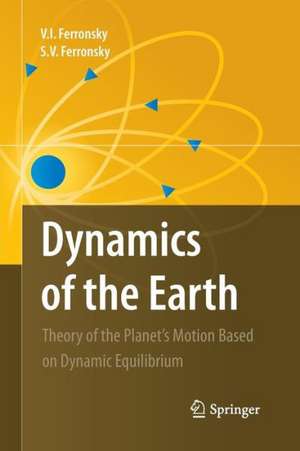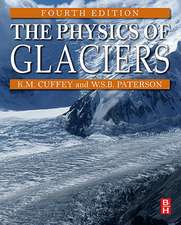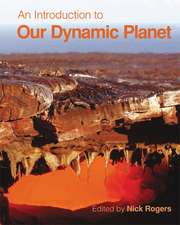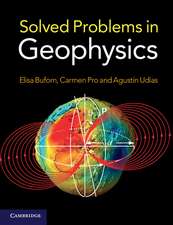Dynamics of the Earth: Theory of the Planet's Motion Based on Dynamic Equilibrium
Autor V. I. Ferronsky, S.V. Ferronskyen Limba Engleză Paperback – 4 noi 2014
The main dynamical effects are: the kinetic energy of oscillation of the interacting particles, which explains the physical meaning and nature of gravitational forces; separation of shells of a self-gravitating body with respect to its mass density; differences in angular velocities of the shell’s rotation; continuity in variance of the potential of the outer gravitational force field, together with reductions in the envelope of the interacting masses (volumetric center of gravity); the nature of Earth, Moon and satellite precession; the nature and generating mechanism of the planet’s electromagnetic field; the common nature of gravitational and electromagnetic energy, and other related issues.
The work is a logical continuation of the book "Jacobi Dynamics" and is intended for researchers, teachers and students engaged in theoretical and experimental research in various branches of astronomy, geophysics, planetology and cosmogony, and for students of celestial, statistical, quantum and relativistic mechanics and hydrodynamics.
| Toate formatele și edițiile | Preț | Express |
|---|---|---|
| Paperback (1) | 635.79 lei 6-8 săpt. | |
| SPRINGER NETHERLANDS – 4 noi 2014 | 635.79 lei 6-8 săpt. | |
| Hardback (1) | 646.62 lei 6-8 săpt. | |
| SPRINGER NETHERLANDS – 9 iul 2010 | 646.62 lei 6-8 săpt. |
Preț: 635.79 lei
Preț vechi: 747.99 lei
-15% Nou
Puncte Express: 954
Preț estimativ în valută:
121.65€ • 127.03$ • 100.46£
121.65€ • 127.03$ • 100.46£
Carte tipărită la comandă
Livrare economică 15-29 aprilie
Preluare comenzi: 021 569.72.76
Specificații
ISBN-13: 9789400792739
ISBN-10: 9400792735
Pagini: 316
Ilustrații: XV, 299 p.
Dimensiuni: 155 x 235 x 17 mm
Greutate: 0.45 kg
Ediția:2010
Editura: SPRINGER NETHERLANDS
Colecția Springer
Locul publicării:Dordrecht, Netherlands
ISBN-10: 9400792735
Pagini: 316
Ilustrații: XV, 299 p.
Dimensiuni: 155 x 235 x 17 mm
Greutate: 0.45 kg
Ediția:2010
Editura: SPRINGER NETHERLANDS
Colecția Springer
Locul publicării:Dordrecht, Netherlands
Public țintă
ResearchCuprins
Irrelevance of the Hydrostatics Model and the Earth’s Dynamic Equilibrium.- Fundamentals of the Theory of Dynamic Equilibrium.- Solution of Jacobi’s Virial Equation for Conservative Systems.- Perturbed Virial Oscillations of a System.- The Nature of Oscillation and Rotation of the Earth.- Dynamics of the Earth’s Atmosphere and Oceans.- The Nature of the Earth’s Electromagnetic Field and Mechanism of its Energy Generation.- Observable Facts Related to Creation and Evolution of the Earth.
Textul de pe ultima copertă
In their search for solutions to problems concerning the dynamics of the Earth as a self-gravitating body, the authors have applied the fundamentals found in their book “Jacobi Dynamics” (1987, Reidel). First, satellite observations have shown that the Earth does not remain in hydrostatic equilibrium, which forms the physical basis of modern geodynamics. Secondly, satellite data have established a relationship between the planet’s polar moment of inertia and the potential of the Earth’s outer force field, which proves the most basic point of Jacobi dynamics. This allowed the authors to revise their derivation of the classical virial theorem, introducing the concept of a volumetric force and volumetric moment, and so to obtain a generalized virial theorem in the form of Jacobi’s equation.
The main dynamical effects are: the kinetic energy of oscillation of the interacting particles, which explains the physical meaning and nature of gravitational forces; separation of shells of a self-gravitating body with respect to its mass density; differences in angular velocities of the shell’s rotation; continuity in variance of the potential of the outer gravitational force field, together with reductions in the envelope of the interacting masses (volumetric center of gravity); the nature of Earth, Moon and satellite precession; the nature and generating mechanism of the planet’s electromagnetic field; the common nature of gravitational and electromagnetic energy, and other related issues.
The work is a logical continuation of the book "Jacobi Dynamics" and is intended for researchers, teachers and students engaged in theoretical and experimental research in various branches of astronomy, geophysics, planetology and cosmogony, and for students of celestial, statistical, quantum and relativistic mechanics and hydrodynamics.
The main dynamical effects are: the kinetic energy of oscillation of the interacting particles, which explains the physical meaning and nature of gravitational forces; separation of shells of a self-gravitating body with respect to its mass density; differences in angular velocities of the shell’s rotation; continuity in variance of the potential of the outer gravitational force field, together with reductions in the envelope of the interacting masses (volumetric center of gravity); the nature of Earth, Moon and satellite precession; the nature and generating mechanism of the planet’s electromagnetic field; the common nature of gravitational and electromagnetic energy, and other related issues.
The work is a logical continuation of the book "Jacobi Dynamics" and is intended for researchers, teachers and students engaged in theoretical and experimental research in various branches of astronomy, geophysics, planetology and cosmogony, and for students of celestial, statistical, quantum and relativistic mechanics and hydrodynamics.
Caracteristici
Explores the relationship between the gravitational moments and the potential of the Earth’s outer force field The first book to describe the nature and mechanism of generation of the inner and outer force field Useful for teachers and students engaged in theoretical and experimental research in astronomy, geophysics, planetology and cosmogony Includes supplementary material: sn.pub/extras
















